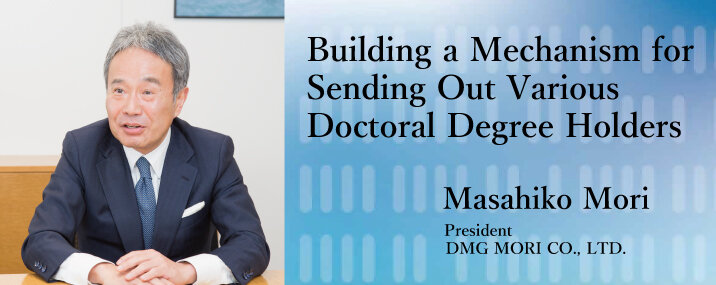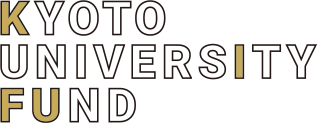Vol.22 Interview with Donors

Masahiko Mori
Born in Nara Prefecture in 1961. Graduated from the Faculty of Engineering, Kyoto University, in 1985, and joined ITOCHU Corporation in the same year. Joined Mori Seiki Co., Ltd. (now DMG MORI CO., LTD.) in 1993. Became a director in 1994, and assumed his current position in 1999. Obtained a degree (Doctor of Engineering) from the University of Tokyo in 2003. Entered into a capital and business alliance with Gildemeister of Germany in 2009. Vice Chairman of Japan Machine Tool Builders' Association, Fellow of CIRP (THE INTERNATIONAL ACADEMY FOR PRODUCTION ENGINEERING), Fellow of SME (Society of Manufacturing Engineers).

Q What were your days at Kyoto University like?
I chose Kyoto University not only because it was close from my parents' place in Nara and many students from my high school entered the school, but also because it has an image of being liberal and full of interesting people, which I thought suited me. Ever since I was a junior and senior high school student, I found Kyoto University fascinating because it had the Academic Alpine Club of Kyoto, founded by Kinji Imanishi, a primate research pioneer, the oldest expedition club in Japan, the subculture of the West Auditorium, and an anti attitude toward the then political system.
After entering the school, I efficiently earned credits and fooled around. I joined the photography club and spent a lot of time shooting and developing photos, and during summer and spring breaks, I got discounted tickets and traveled around Europe and Australia.
However, after I joined a laboratory specializing in cutting engineering, I worked seriously on experiments, turning lathes from about 11 p.m., when it was my turn to use the laboratory. Since I had a car, I often drove my teacher to the countryside for measurements.
During my days at Kyoto University, what I was most enthusiastic about was studying English. I knew I would definitely need English, so I went to a Berlitz school, at a time when there were only of few of such schools in Japan, and spent my summer vacation immersed in English from morning to night.
I became interested in foreign countries and felt the need for English perhaps because of the times and the environment I grew up in. Various factors must have influenced me. I lived in Nara, the terminus of the Silk Road, which was surrounded by continental cultures. I grew up in a period of high economic growth as a child, when there was a tendency to learn everything from Europe and the United States. My family business started selling machines overseas in the early 1970s. And I began to think about Germany and England, the originators of machine tools.
Q How did you end up joining a general trading company instead of
going to graduate school?
I was considering both entering a graduate school and finding a job, but I failed my graduate-school entrance examination.
At this point, I did not feel like joining my family business and working with my parents. Therefore, I decided to join ITOCHU Corporation because it was a workplace where I could use my English skills and my ability to understand European technology.
As I had hoped, I was entrusted with overseas-related work, and I became involved in sales of textile machinery. I enjoyed my work, but being a salaried worker, I could see my limitations within the organization. After the bursting of the bubble economy, trading companies started to change their business model from trading to business investment, and I could not expect myself to grow in my department. Around that time, my father became ill and I decided to return home to join my family business. Consequently, the various experiences I had at my previous job have been put to good use in my family business, including overseas expansion.
Q Do you find your days at Kyoto University helpful now, and what is
the best thing about your time at Kyoto University?
Of all the assets I have gained at Kyoto University, none is greater than my personal network. I am an auditor of the Kyoto University Mechanical Engineering Alumni Association, and many companies that members of the association work for are my company's customers, so I have been helped in many ways, including creating business opportunities. I am grateful.
Another good thing about Kyoto University is that it is a school with a name that needs no explanation when working overseas. Learning the "table of contents" of academics was also a great benefit. If you know the academic system and what kind of researchers there are in each field, you can study and access teachers as necessary.
I continue to have a close relationship not only with our alumni but also with Kyoto University. I was able to gain valuable experience as an extramural member of the Administrative Council and as an outside director of Kyoto University Innovation Capital (Kyoto iCAP).
Q What kind of efforts do you look forward to seeing Kyoto University
make in this 125th anniversary year and after, and is there
a message you want to leave Kyoto University students with?
Having been interested in foreign countries since I was young and having developed overseas business, I know firsthand the importance of a doctoral degree. I was often told by my collaborating professors that I would not give a good impression in Europe without a doctoral degree. So, with help from my professors, I spent five years pursuing research at a graduate school at the University of Tokyo while working as a president, and I obtained a doctoral degree in 2003.
Business partners of foreign companies treat you very differently depending on whether you have a doctoral degree. A doctoral degree is essential for doing business globally, and people with such a high level of experience are active in overseas companies. However, in Japan, I think that companies are not very eager to hire people with doctoral degrees and are not maximizing their human resources. This will only diminish Japan's global competitiveness.
My company has a system in place that allows two employees to enroll in graduate school as working adults every year, but the challenge is to increase the number of doctoral degrees in the humanities. While all 40 of our Japanese doctoral degree holders are in engineering, 30 out of 40 German doctoral degree holders are in the humanities, such as economics, psychology, and marketing. Therefore, I would like Kyoto University to take the lead in creating a system to send out a certain number of doctoral degree recipients from the humanities departments every year. It can be 20 people every year. If their dissertations are translated into English, the world ranking of Kyoto University will naturally rise.
There should be plenty of opportunities for doctoral degree holders to play an active role in companies. For instance, a Ph.D. holder in psychology could work in Human Resources, while a Ph.D. holder in marketing could work in Public Relations. However, at the same time, we need to change the mindset of the management level. If companies become more proactive in hiring doctoral degree holders, prospective doctoral students will know that they can lead a successful life and the percentage of students going on to pursuing a Ph.D. will increase. I think it is important for both universities and companies to make an effort.
One of the characteristics of Kyoto University graduates is that many of them are great runners-up. Kyoto University graduates value saying the right thing, prioritize what is interesting, and seem to enjoy walking the path of their choice. I look forward to seeing Kyoto University continue to cultivate such people. I also hope that Kyoto University itself will not be carried away by the trend of thinking "If you can't beat them, join them" but will say what needs to be said and will enhance its own presence.
Now is the time when capitalism is undergoing structural change, so unique ideas are needed. Located far from Tokyo and good at coming up with original ideas, Kyoto University is in a good position. Please take advantage of that priority.
(Interviewed in April 2021)

